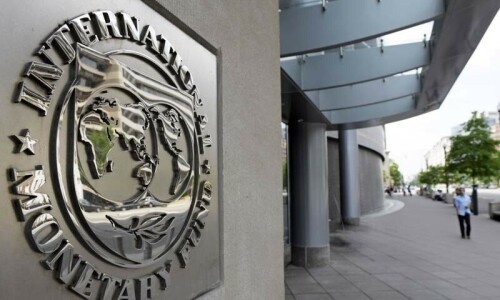
ISLAMABAD: The caretaker federal government and the Election Commission of Pakistan (ECP) decided on Saturday to take the controversy arising out of the Lahore High Court’s verdict striking down the nomination forms for the electoral candidates to the Supreme Court, but are set to take different positions in their separate pleas most likely to be filed on Monday.
While caretaker Prime Minister retired Justice Nasirul Mulk has directed the attorney general to file an appeal against the verdict, the ECP — which sees the LHC judgement as endorsement of its view that preparation of nomination forms was its exclusive domain — will seek to address an ambiguity in the ruling that wants it to improve the nomination forms but at the same time recognises parliament’s right to make nomination form part of the Elections Act.
Talking to reporters after an emergency meeting, ECP’s Additional Secretary Dr Akhtar Nazir pointed out that the commission had also not voided the relevant sections of the Elections Act. He said the ECP’s view that the nomination forms should have been part of rules that were framed by the commission remained unchanged.
Returning officers restrained from receiving nomination papers for another two days
He said the meeting presided over by Chief Election Commissioner retired Justice Sardar Mohammad Raza also decided to challenge the Balochistan High Court’s decision of setting aside delimitation of eight provincial assembly constituencies from Quetta and directing the ECP to carry out the exercise afresh.
Dr Nazir said the commission ordered the returning officers not to receive nomination forms from the electoral candidates for the next two days (Sunday and Monday) as well, but claimed that the general elections would take place on July 25 as scheduled.
Experts, however, believe that after waste of at least three of the total five days mentioned in the schedule for filing of nomination papers, the commission would be required to modify the schedule — something which may delay the polls for days if not weeks.
A senior ECP official told Dawn that the new nomination forms drafted by the parliamentary committee on electoral reforms without hearing the ECP and passed by parliament did not meet the disclosure requirements and the basic information the voter had a right to know about was missing from them. He said it would prevent the electorate from taking an informed decision.
Giving details of the declarations and other key information that was required to be filed and provided under nomination forms for the 2013 general elections and done away with in the new nomination forms, the official said these included declaration on outstanding loans from any bank, etc, in the name of candidates or their spouses or dependents, declaration on default in payment of government dues or utility charges, lists containing names of spouse and dependents, declaration about companies owned by the candidates or any dependants, declaration on pending cases of criminal offences, declaration of educational qualification, declaration of present occupation, national tax number, declaration of income tax paid during the last three years, declaration of travel abroad during last three years, declaration of agricultural income tax paid, declaration of important contribution made by the candidates for the benefit of candidates’ constituents, if elected previously, declaration of sum paid to or received from any political party that awarded the ticket to candidate, declaration to abide by the code of conduct issued by the ECP, declaration of net assets of the current and previous financial years and difference between the two, value of assets, declaration of foreign passport details, declaration of personal expenditure, statement on oath that candidate is a citizen of Pakistan and does not possess any other nationality.
Published in Dawn, June 3rd, 2018








































Dear visitor, the comments section is undergoing an overhaul and will return soon.